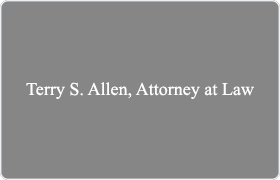 Pala Misdemeanor Lawyers, California
Pala Misdemeanor Lawyers, California
Sponsored Law Firm
-
 x
x

Click For More Info:
-
Terry S. Allen, Attorney at Law
316 South Melrose Dr Suite 206 Vista, CA 92081» view mapCriminal Defense Law Defending Your Rights
Terry Allen is a practicing lawyer in the state of California who handles Criminal and DUI cases.
800-852-8530
Sponsored Lawyers
1-1 of 1 matches
Criminal, Felony, Misdemeanor, DUI-DWI, White Collar Crime
Over the years I have worked on cases spanning many areas of law such as marriage dissolution issues, transferring trademarks, elder abuse, financial abuse, restraining orders, domestic violence charges, reviewing contracts, updating trusts, government-tort liability, and real estate disputes. Additionally, I have extensive experience in Criminal Law. Experience in the legal field has taught me many important lessons. I always work to keep my clients informed. I show my clients respect and try to explain everything in terms that are understandable. I routinely consult with clients regarding their most intimate and important issues. I advise my clients to choose their battles wisely because it is important to me that the best possible results are obtained in each individual situation. My office is centrally located in San Diego, and I represent clients throughout the entire county.
(more)



 Terry Allen Vista, CA
Terry Allen Vista, CA AboutTerry S. Allen, Attorney at Law
AboutTerry S. Allen, Attorney at Law Practice AreasExpertise
Practice AreasExpertise

